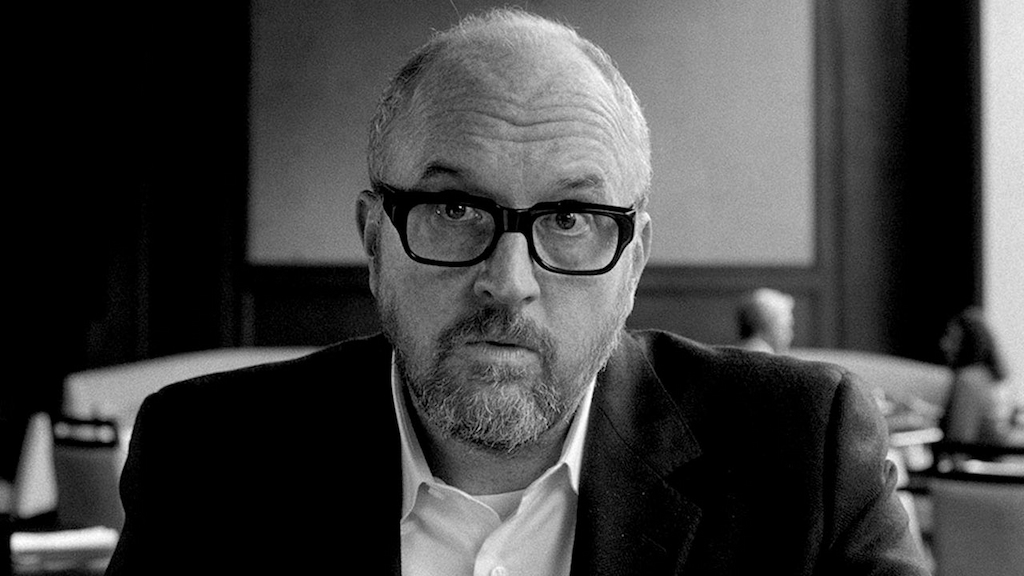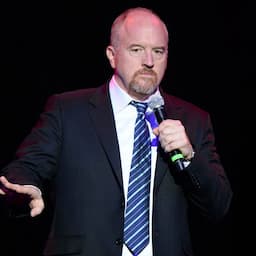Why would man who says he's trying to run from his own sexually predatory behavior make a movie all about sexually predatory behavior?
On Thursday, The Orchard announced it would be "giving careful consideration" to the release of Louis C.K.'s film, I Love You, Daddy, in the wake of allegations of sexual misconduct against the comedian. It took less than 24 hours of consideration for the distributor to scrap it altogether. Sure, you could do like Ridley Scott and recast C.K. with Christopher Plummer, but Plummer can't rewrite and reshoot the entire movie, too.
That the movie should never see the light of day is only a shame for one reason: the actresses, especially -- Chloë Grace Moretz, Edie Falco, Pamela Adlon, Rose Byrne -- give great performances. But also, there is no reason this movie ever should have happened. Considering C.K. is (or was) one of the most successful working standups and a six-time Emmy winner still extolled for his series, Louie, he seemingly could have made any movie he wanted. (Considering he self-funded I Love You, Daddy and shot the movie in secret, the "seemingly" is moot.) Why would he make this in the first place?
"I have been remorseful of my actions. And I've tried to learn from them. And run from them," C.K. said in a statement on Friday. I attended a pre-scheduled screening of I Love You, Daddy on Thursday, as the C.K. news was breaking, and now must question the sincerity of a man who says he's been trying to run from his own sexually predatory behavior when he made a movie all about sexually predatory behavior.
In I Love You, Daddy, C.K. plays Glen Topher, an Emmy-winning TV creator driven into an existential crisis when his 17-year-old daughter, China (Moretz), becomes involved with his filmmaking hero, 68-year-old Leslie Goodwin (John Malkovich), a legendary auteur known for his proclivity towards young woman and rumored to have been sexually involved with a minor.
"Isn't he a child molester?" China asks when they first encounter Leslie.
"Allegedly," Glenn quickly replies.
Even before The New York Times investigation ran this week, I Love You, Daddy, which was set to open in theaters on Nov. 17, was perhaps the most ill-timed movie of all time. The movie is both an homage to C.K.'s own idol, Woody Allen -- it's Manhattan (in which Allen plays a 42-year-old writer who is dating a 17-year-old girl) with FaceTime -- and the Leslie character is a clear stand-in for Allen. (One extended sequence sees Leslie whisk China off to Paris, as Manhattan's Mariel Hemingway wrote in her memoir that Allen tried to do when she turned 18.)
Though Glen defends Leslie earlier on -- "You shouldn't say stuff like that about someone you just hear stories about," he tells China. "His private life is nobody's business." -- he starts to unravel when it is his own daughter in the stories. This culminates in a scene between Glen and the actress he's sleeping with (Byrne), in which C.K. writes himself as the defensive father the audience sides with -- he thinks Leslie's grooming of young girls is wrong -- while Byrne's character, Grace, launches into a defense of age being just a number, that women's sexuality should not be policed and reveals that when she was 15, she was involved with a 50-year-old.
"I'm sorry, Grace, but you were raped," Glen tells her, which she takes offense to. The scene is played in gray, a morally complicated question that actually isn't all that complicated. As the Kevin Spacey fallout should be a clear reminder, 14 and 15 year olds are not adults, despite what they themselves may think, that within the industry or not, the power imbalance between an adult and teenager is clear.
Instead, Leslie is painted as creepy and inappropriate, but clearly charming. "He's kind of gross, but he's hilarious," China says. Any advances are shrugged off as that of an "old pervert" in an "aw, shucks" way, and as far as accusations of pedophilia go, Leslie is asked, "Hey, did you really f**k that kid like everyone says you did?" He laughs it off, as C.K. either isn't willing to or interested in saying.
C.K. never seems to know what to feel about the character he's written. He asks a lot of questions in I Love You Daddy -- about consent, about power, about separating the art from the artist -- but doesn't come to many conclusions. In a post-Weinstein, post-Spacey, post-Ratner, post-Toback climate, I Love You, Daddy doesn't add much to the conversation, in the end. (But C.K. sure does get to say "retard" a lot on the way.)
Perhaps that's because he knew eventually these would be questions we would be asking of him. In one scene late in the movie, after rallying against Leslie, Glen sits down with China's 17-year-old best friend, Zasha (Ebonee Noel) and Zasha argues that "China's the real pervert," and in fact, "We're all perverts." When she reveals that she had a crush on Glen when she was 14, he makes a pass at her. I'm not better than this, you could read the scene as saying. As much as I may say otherwise, we really are all perverts.
Except that, in the past when he has been faced with the same accusations published in the Times, C.K. dismissed them. Talk of C.K.'s habit of masturbating in front of unwilling women has gone on as far back as 2012, originally in blind items and whispered secondhand stories and then spoken outright as an "open secret." Earlier this year, Tig Notaro said C.K., who is named as an executive producer on her series, One Mississippi, needed to "handle" the allegations.
"I don't know why she said what she said," C.K. told the Times in September. "They're rumors. That's all."
Rumors like the rumors that follow Leslie in I Love You, Daddy, which C.K. reconciles with a resounding, It's complicated. "The uncomfortable truth is, you never really know. You don't know anybody. To me, if there was one thing this movie is about, it’s that you don’t know anybody," C.K. has said. It seems we, as a society, are beginning to realize that's not always true. We believe. In that way, the movie feels like a disclaimer, like C.K. is trolling us.
Consider a scene where Glen and Charlie Day's character, Ralph, are in Glen's office when he gets a call from Byrne's Grace. Ralph begs Glen to take the call on speakerphone, which Glen does without Grace's knowledge. Ralph proceeds to mime masturbating over the thought of Grace throughout the entire call, even as Falco's harried producer enters the room, to completion. Consider in the Times investigation, a writer said that she realized during a phone call with C.K. that he was masturbating. It might feel galling now, but C.K. could get away with making this movie because he had no reason to think he couldn't get away with it.
"There is nothing about this that I forgive myself for. And I have to reconcile it with who I am. Which is nothing compared to the task I left them with," C.K. also wrote in his statement. "The hardest regret to live with is what you've done to hurt someone else. And I can hardly wrap my head around the scope of hurt I brought on them."
Yet, towards the end of I Love You, Daddy, Glen laments, "I'm sorry! I'm sorry, women. Please, on behalf of all women, please let you all know that I am very f**king sorry." (Which, for the record, is apologizing more times than C.K. did in his supposed apology.)
"OK," Adlon's character, as scripted by C.K., tells him. "We accept."

